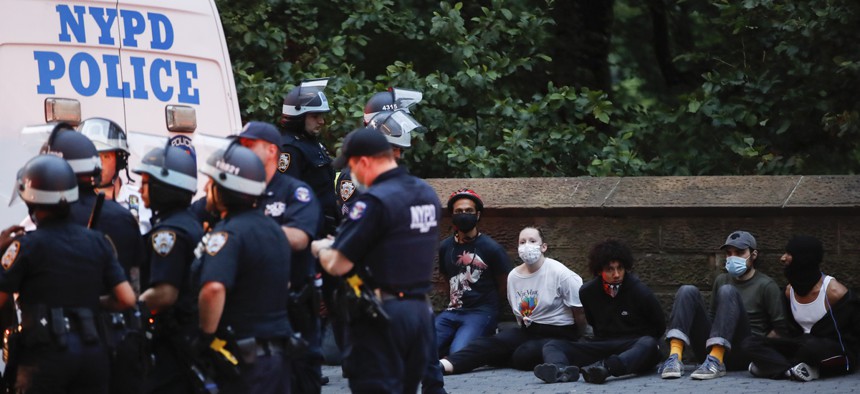Hundreds of New York City Staffers Write to Mayor Demanding Police Reform and Budget Cuts

New York City staffers called for an investigation into NYPD practices during recent protests. AP Photo/John Minchillo

Connecting state and local government leaders
New York City municipal employees condemned Mayor Bill de Blasio’s response to recent protests and demanded changes to the city’s police department.
More than 400 current and former New York City employees wrote an open letter to Mayor Bill de Blasio this week condemning his response to the recent protests in the city and demanding that he make reforms to the police department and re-evaluate the city’s budget.
“We came to the Mayor’s Office from different places and walks of life, but we all shared a common goal: to work for a fairer, more just New York City,” the open letter begins. “Our time in the Mayor’s Office showed us that the change we had hoped for, and fought for, might never come.”
When the letter was originally released on Wednesday, it was signed only by mayoral staffers from the central offices of data analytics, operations, speechwriting, workforce development, and others—but that list has quickly expanded to include hundreds of city agency staffers from the sanitation department, human rights commission, parks and recreation department, and more.
The letter takes aim at de Blasio’s record on criminal justice and policing reform, noting that while none of the staffers “believ[ed] this mayor would be radical on criminal justice policy,” they still saw “a chance for real change” that they argue hasn’t come.
The staffers wrote about their disappointment that de Blasio did not fire Daniel Pantaleo, the white police officer who in 2014 held Eric Garner in a chokehold while he repeatedly said “I can’t breathe.” Following Garner’s death, activists called for Pantaleo to be fired and charged, but de Blasio maintained that he did not have the legal authority to do that.
The letter also condemns de Blasio for his handling of the city’s jails, particularly for refusing to stop the use of solitary confinement and pushing to build four new jails in the city as part of a plan to close Rikers Island. This also included criticism of the city’s handling of coronavirus as it raged through Rikers—one of the earliest correctional facility hotspots for the virus in the country.
Finally, the letter criticizes the way the city has handled the recent protests over George Floyd’s death, saying that while New Yorkers have called for an end to police brutality, de Blasio has “stood with the very police who perpetrate that violence.” During the protests, multiple videos have surfaced of police in New York beating peaceful protesters with batons, ramming them with police cars, and covering their badge numbers and other identifiers. De Blasio has promised to investigate some of these incidents.
But de Blasio, who ran on a campaign of police reform, has said that the “NYPD is overwhelmingly acting appropriately” in handling the protests. “For anyone out there who is concerned or criticizing, I’m not sure they understand the depth of the reality of what we’ve faced,” he said on Thursday. “We have to keep the peace. We have to keep order. We have to protect our democracy and our democratic rights. We’re striking that balance all the time.”
The mayor has not publicly responded to the letter, but Freddi Goldstein, a spokesperson for the mayor, challenged the assertions made by the staffers about de Blasio’s record. “He has worked hand-in-hand with reformers to fundamentally change policing in this city and end the era of mass incarceration,” she said in a statement. "And we’re not done.”
Whether de Blasio will be responsive to the four demands at the end of the letter is yet to be seen. The staffers ask the mayor to fire any NYPD officers who have used excessive force or covered their badges at recent protests, to release the names and official disciplinary records of all NYPD officers accused of misconduct, and appoint an independent commission composed of civil rights attorneys, journalists, and activists to investigate the actions taken both by the mayor’s office and the NYPD between May and June 2020 in response to the protests.
The last and largest demand asks de Blasio to cut the NYPD operating budget, which has grown by almost $1 billion since he first took office. The signatories want to see that $1 billion reallocated to social services, housing support, and health care. Given that the city is in what de Blasio called a “fiscal crisis” brought on by the coronavirus-induced economic downturn, the city, like many, will have to make cuts to its upcoming budget—but de Blasio has been largely resistant to calls from activist groups, city councilmembers, and others to find those cuts in the NYPD’s budget.
New York City’s comptroller on Thursday also issued a call for a $1.1 billion cut to the NYPD budget in order to fix the budget gap and invest more in social services. His proposal envisions phased cuts of $265 million per year over four years.
“If our budget is a reflection of our values, it is unconscionable that services for Black and Brown New Yorkers are on the chopping block while the NYPD’s budget remains almost entirely untouched,” said Comptroller Scott Stringer.
Emma Coleman is the assistant editor for Route Fifty.

NEXT STORY: Prosecutorial Discretion: The Prosecutor’s Role in Curbing Infections in Prisons





